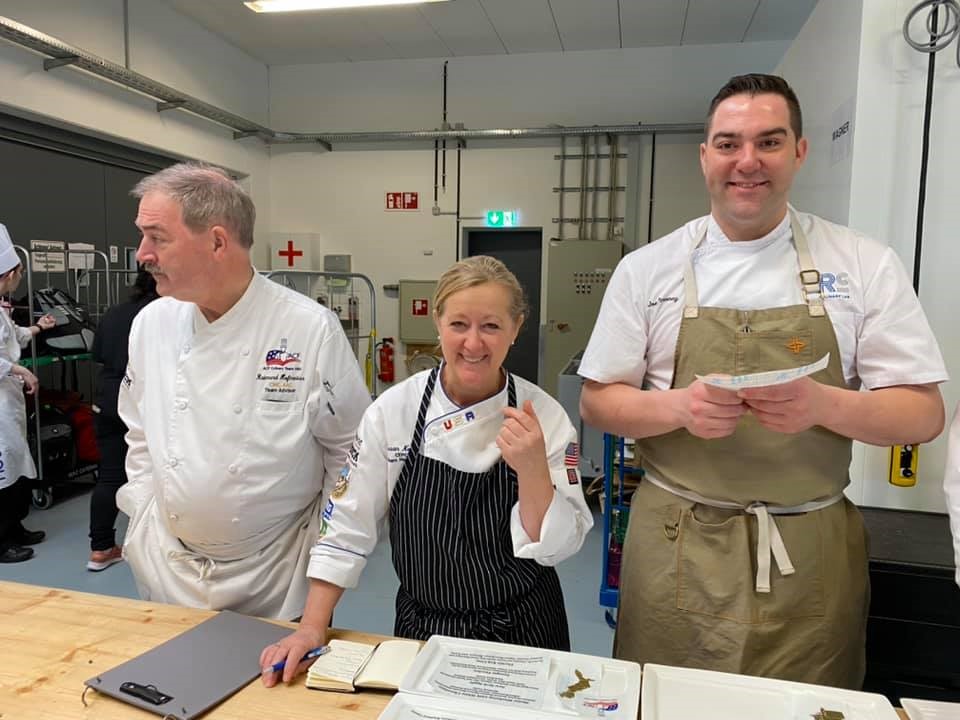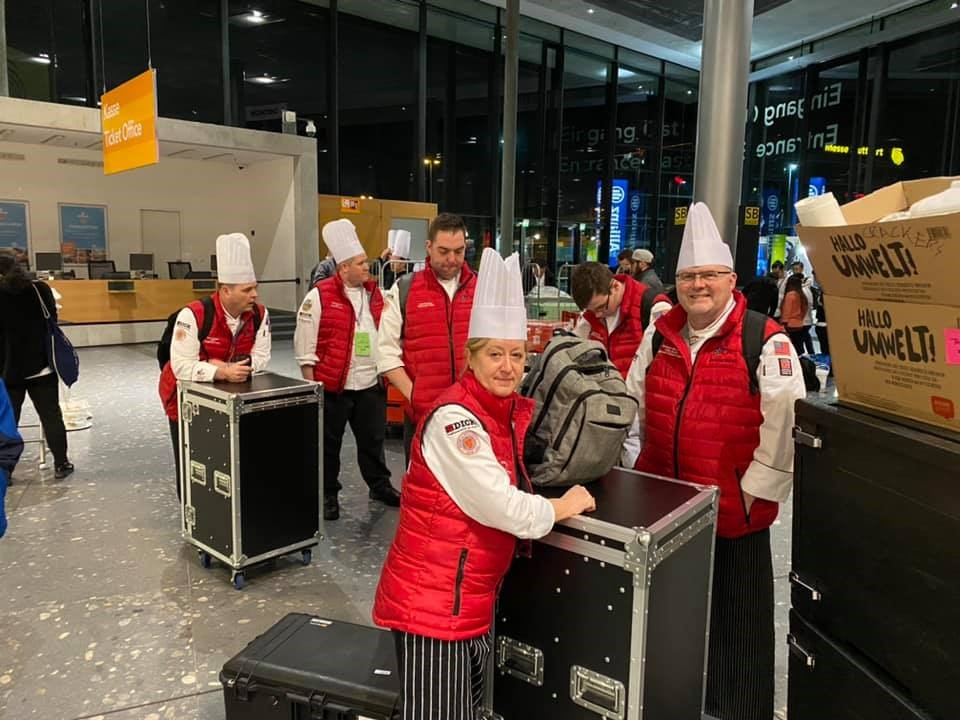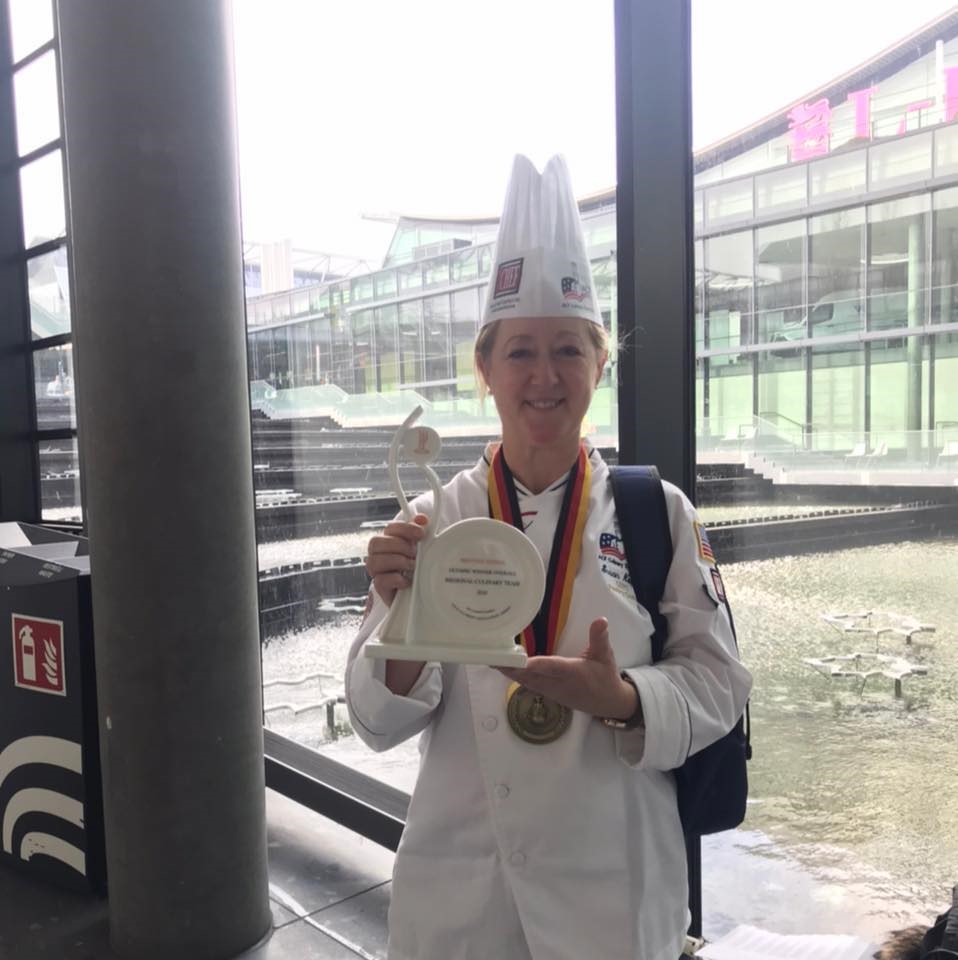Alabama pastry chef knows sweet side of Olympic competition

Chef Susan Notter is a gold medal winner and coach for the IKA/Culinary Olympics Team. (contributed)
Alabama has had plenty of connections to Olympics competition over the years but perhaps none as sweet as what Susan Notter does. This pastry chef, who has worked all over the world but lives in Birmingham, is a coach for the U.S. Culinary Olympics Team, and she’s a gold medal winner, too.
The IKA/Culinary Olympics is the world’s largest, oldest and perhaps most multifaceted culinary art exhibition. The last event, in 2020 in Stuttgart, Germany, attracted some 1,800 participants from 67 nations. These chefs prepared 8,000 menus and entertained some 100,000 visitors from all over the world. That year, Notter and her U.S. Regional Team won gold and finished third overall in a field of more than 40 regional teams.
The Culinary Olympics has been a highlight for the global cooking community for almost 125 years. The event features five days of culinary exhibitions – some with paying guests sitting at the dining tables. Everything – from prep to presentation, from food safety to flavor – is strictly judged. The professional chefs who compete at these Olympics do so individually and as members of teams.
There’s even an opening ceremony.

Chef Susan Notter, center, competes in the IKA/Culinary Olympics. (contributed)
“You march in a line behind the flag, just like the Olympics,” Notter says. “It’s really cool to be part of this. I mean, you feel very proud to be there, marching behind your flag.”
Also like the sporting Olympics, national teams wage exciting competition between countries. Within this National Team category, there’s the Restaurant of Nations: a three-course menu for 110 people. Guests buy tickets and choose which country’s food they want to enjoy. They are served at tables set up near the teams’ glass cooking boxes.
“It’s all live,” Notter says. “They have a six-hour window in which to prepare the food, and then there’s a two-hour service window per ticket. … During that service window, plates will go to the judges (seated with guests), but you don’t know which plates are going out to the judges. So everything has to look exactly the same. You have to submit recipes and pictures, almost like a little book, ahead of time. So as (the dish) goes to the judges, they will compare it with what the picture looks like.” In addition to the tasting judges, there also are floor judges watching the preparation “walking around all the time while you are working.”
Another competition, The Chef’s Table, sees seven different dishes for twelve people – from dips and cold and hot plates through to petit fours. A complete vegan course is also included. Notter likens it to dining in a Michelin-star restaurant; there’s even a challenging and complicated tableside fish service.
A Junior National Team competition offers opportunities for young cooking talents up to the age of 25. This also has a Restaurant of Nations (a three-course menu for 60 paying guests). The IKA Buffet is a buffet of cold and warm finger food, a hot main dish, seafood, game and desserts for 12 people.
There are Regional Teams from countries around the world, Community Catering Teams, Armed Forces Teams and Individual Exhibitions. These individual exhibitors – food artists and carving virtuosos – present edible works of art and sculptures made of vegetables, butter or chocolate. Categories include Culinary Art, Pastry Art, Classic Fruit and Vegetable Carving, Live Carving and Artistic Sculptures.
The Culinary Olympics happens during the same years as the traditional summer Olympics, so the next competition, the 26th edition, will be held Feb. 2-7, 2024, again in the Baden-Württemberg capital of Stuttgart.
Notter and her team are already training.
The teams have six chefs, ideally, she says – four culinary chefs and two pastry chefs. She’s the Pastry Coach for the U.S. National Team whose members live and work all over – from California to Missouri to Virginia to Florida.
They meet monthly, in a different part of the country, for practice sessions, usually at a school that can host them and give them enough kitchen space. They are heading to Roanoke, Virginia, next. They were just at Utah Valley University. “I stayed an extra day,” Notter says, “and I did a chocolate tempering and ganache demo for all the students. So what we do is we try and give back in terms of education when we’re there.”
They practice every aspect of what they plan to bring to competition.
They generally fly in on Sunday to prep, and on Monday they do the six-hour Restaurant of Nations run. The next day is The Chef’s Table run. “So right now we are still working on R&D (research and development) a little bit on what the final products will be but also on timing and getting things out on time.” The teams serve people invited by the school, people from the college’s culinary programs, and those guests give them feedback.
Notter is excited about the pastry chefs on her team. Both are from the Philippines originally and are in their 20s. “They are young and very creative.”
One of these chefs has worked in Russia, Paris and Tokyo, is currently with the Waldorf Astoria group and is an expert in different flavor profiles, she says. The other pastry chef is with the Ritz-Carlton in Orlando, has also worked internationally and is amazing, she adds. “Showpieces and ideas and themes, they can carry all that through.”

Chef Susan Notter with the U.S. team at the Culinary Olympics. (contributed)
The team will compete in November in Luxembourg, and the next competition will be the 2024 Culinary Olympics. They will have custom platters made as well as custom utensils. Large, national culinary equipment companies and food producers help fund all this. The chefs work for the experience and, hopefully, the gold.
In the meantime, there are some perks, too. Next month, the team is heading to New York for some R&D dinners. They’ll dine at Eleven Madison Park and Per Se where they will observe how the service is done, how the chefs interact with the guests, and they will study the food philosophy and the style of the presentations.
In the past few years, the Nordic countries like Norway and Sweden have done well at the Culinary Olympics, Notter notes. They have a mindset that embraces clean, simple foods with natural presentations but with a highly creative factor, too. That’s vitally important, she says, mentioning one memorable dish that looked like a pebble with a rough, black surface. “Ash is added to the frying batter, the coating,” she says, “and inside it’s foie gras. When you bite into it, it’s almost molten. … It’s that illusion of you’re not quite sure what it is, but when you bite into it, it has this complete ‘wow’ effect. Those are the kinds of ideas we have to work on. … You want (diners and judges) to question, ‘How did you do that?’ … It’s like an illusion, but it’s flavorful and exciting and things are perfectly cooked.”
Notter, who grew up in Birmingham, England, first came to Birmingham, Alabama, in 2001 to open the baking and pastry division of Culinard, the culinary program that started at Virginia College.

Susan Notter with her gold medal and third-place overall trophy from the 2020 Culinary Olympics. (contributed)
She had attended culinary school in England and spent three years in Germany developing her skills in European pastry arts and becoming fluent in that language. She then moved to Switzerland, working for Swiss chocolatiers in Luzerne and Zurich before joining forces with Chef Ewald Notter at the International School of Confectionery Arts, teaching and demonstrating the art of pulled and blown sugar all over the world. Culinard followed. Notter, who was the Director of Pastry Arts there, says she loved the idea of building the program from the ground up.
In total, she spent 17 years in education, teaching and directing pastry arts programs before going to work for the Swiss-based internationally known Max Felchlin AG in the position of USA sales professional. She came back to Birmingham (Alabama) in 2020 because her job with Felchlin, she says, allows her to live anywhere as long as there is an airport nearby. Plus, she says, the weather is warm and so are the people.
A culinary artist for sure and a teacher at heart, Notter says she truly enjoys sharing her knowledge and her passion for pastry with students and other pastry professionals in the industry. But she has a competitive spirit, too. In addition to competing on various U.S. Culinary Olympic teams over the years, she appeared on the Food Network with the winning team of the first season of “Halloween Wars.”
She also coached and competed in the Queen of Pastry Competition in Rimini, Italy. That is one and a half days of everything from sugar showpieces to frozen confections to plated desserts. Each time she’s been there – as a competitor or coach on behalf of the U.S. – she’s placed in the top three. She says this competition is especially meaningful because it’s the United States going up against countries like France and Spain and Switzerland that all have long histories in pastry. “That says something about the U.S.,” Notter adds. “About what we’re doing here and about women in the industry.”
Notter went to her first Culinary Olympics in 1984 when she lived in Switzerland and competed on a team from Zurich. In 1996, after moving to the United States, she was asked to be on a team representing the state of Maryland. She competed on the national team in 2000 and again in 2016. In 2020, she was asked to coach an East Coast regional team but ended up competing herself.
These days she’s content with her role as pastry coach for the U.S. National Team.
“The first time I competed I was 17, but the last time I competed I was 59,” Notter says. “So I think it’s time for, ‘OK, Susan, stop.’ But I still have that tingling inside, right? I still want to be there.” But she doesn’t miss the physical aspects of a week of competitions. “I love coaching. I see what’s going on. I’m involved, I go to the competition, meet all the teams, but I don’t have to actually physically be in the kitchen for 14 hours, 15 hours. … It’s time not to be that.” This kind of competition is about ideas, she adds, “and that comes with youth and with freshness. I’ve done my bit.”




















